Setting out on a captivating 2-day journey from Istanbul, travelers can uncover the ancient wonders of Ephesus and Pamukkale. Day one explores the renowned archaeological site of Ephesus, including the House of Virgin Mary, Temple of Artemis, and well-preserved Greco-Roman ruins. The second day ventures to the UNESCO-listed Pamukkale, known for its iconic white travertine terraces and the ancient city of Hierapolis. With a wealth of history and natural beauty, this tour promises an immersive experience that will leave one intrigued to discover more.
Key Points
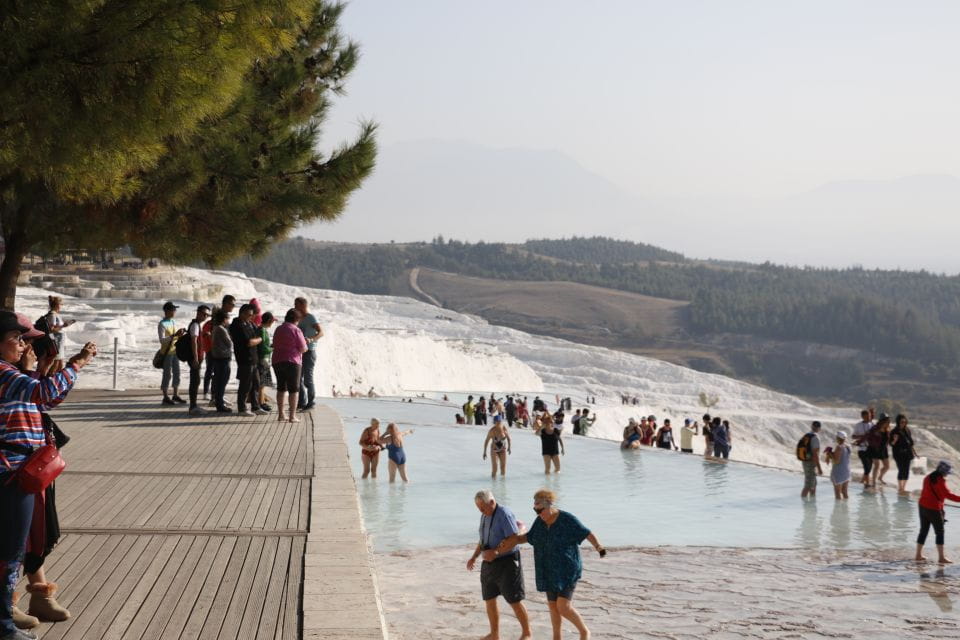
- A 2-day tour from Istanbul that visits the ancient sites of Ephesus and Pamukkale, including a flight to Izmir and an overnight stay in Kusadasi or Selcuk.
- Exploration of Ephesus, showcasing its amphitheater, marble streets, terrace houses, and religious sites like the House of Virgin Mary and Church of St. John.
- Visit to the UNESCO World Heritage site of Pamukkale, known for its white travertine terraces and the ancient ruins of Hierapolis.
- Opportunity to soak in the warm, mineral-rich waters of Pamukkale’s natural hot springs.
- Inclusions such as hotel pickup and drop-off, domestic flight tickets, English-speaking tour guide, and free cancellation up to 24 hours in advance.
Trip Overview
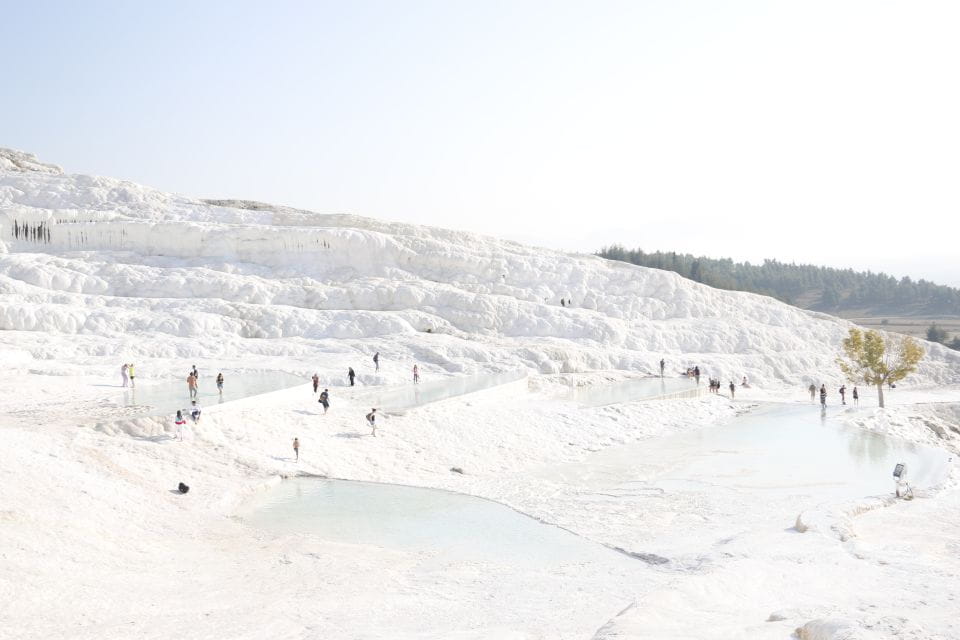
This 2-day trip from Istanbul takes travelers to explore the ancient sights of Ephesus and Pamukkale.
The trip includes a flight from Istanbul to Izmir, a visit to the House of Virgin Mary, Temple of Artemis, Church of St. John, and Isa Bey Mosque in Ephesus. Travelers will also tour the ancient city of Ephesus and visit the charming village of Sirince to sample local wines.
On the second day, the group will travel to the UNESCO World Heritage site of Pamukkale and tour the ancient city of Hierapolis before flying back to Istanbul.
Travelers will stay overnight in either Kusadasi or Selcuk during the trip.
Here are more great tours and experiences we've reviewed in Selcuk
Day 1: Ephesus Tour
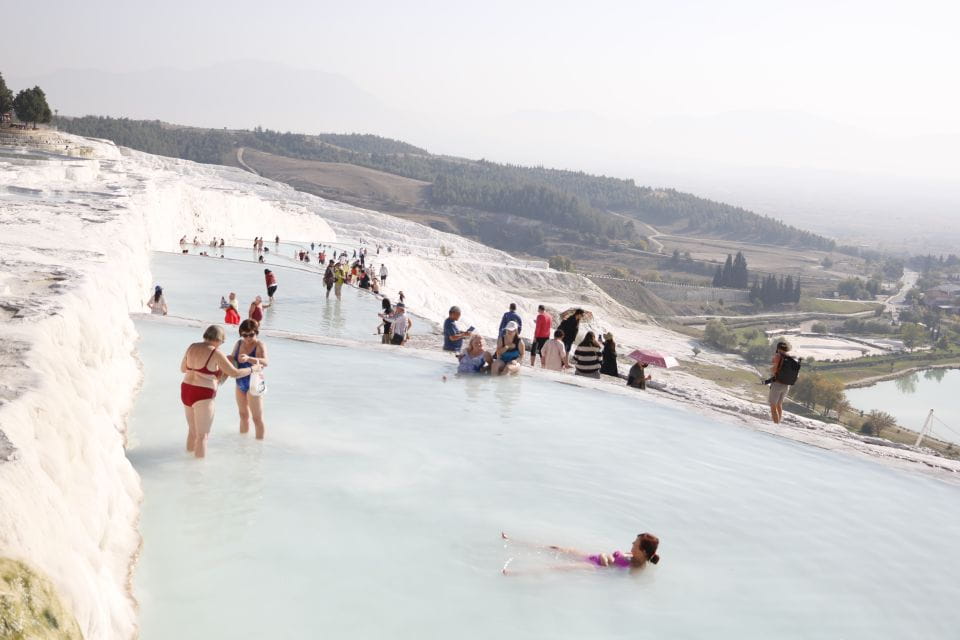
The first day of the trip commences with a flight from Istanbul to Izmir, where travelers embark on a tour of the ancient city of Ephesus.
The highlights of the day include:
- Visiting the House of Virgin Mary, a revered pilgrimage site.
- Exploring the impressive Temple of Artemis, one of the Seven Wonders of the Ancient World.
- Stepping inside the Church of St. John, a historic Byzantine structure.
- Discovering the Isa Bey Mosque, a stunning example of Seljuk architecture.
After a comprehensive tour of Ephesus, the group visits the charming village of Sirince, known for its local wines and traditional Turkish hospitality.
Exploring Ephesus Ancient City
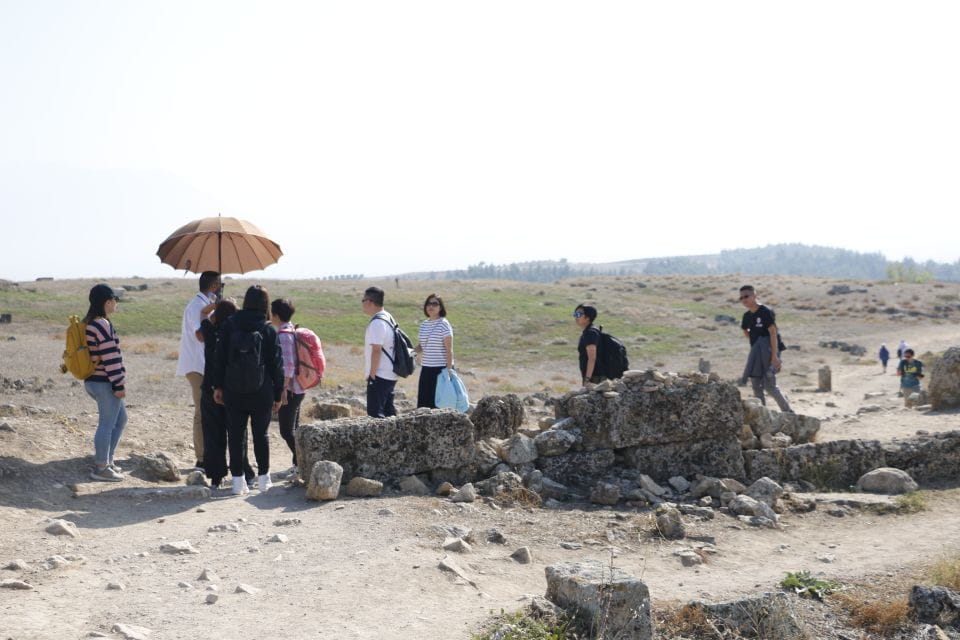
After exploring the religious and historical sites surrounding Ephesus, the tour moves on to the ancient city itself. Visitors can wander through the incredibly well-preserved ruins, marveling at the grandeur of this once-thriving metropolis. The city’s iconic Library of Celsus stands tall, its intricate facade a testament to the architectural prowess of the Ephesians.
| Key Features | Significance |
|---|---|
| Amphitheater | Once held over 25,000 spectators for performances and events |
| Marble Streets | Showcase the advanced urban planning of the ancient city |
| Terrace Houses | Provide insight into the luxurious lifestyles of Ephesus’ elite |
The ancient city of Ephesus offers a captivating glimpse into the past, allowing visitors to step back in time and enjoy the rich history of this remarkable archaeological site.
Visiting Religious Sites
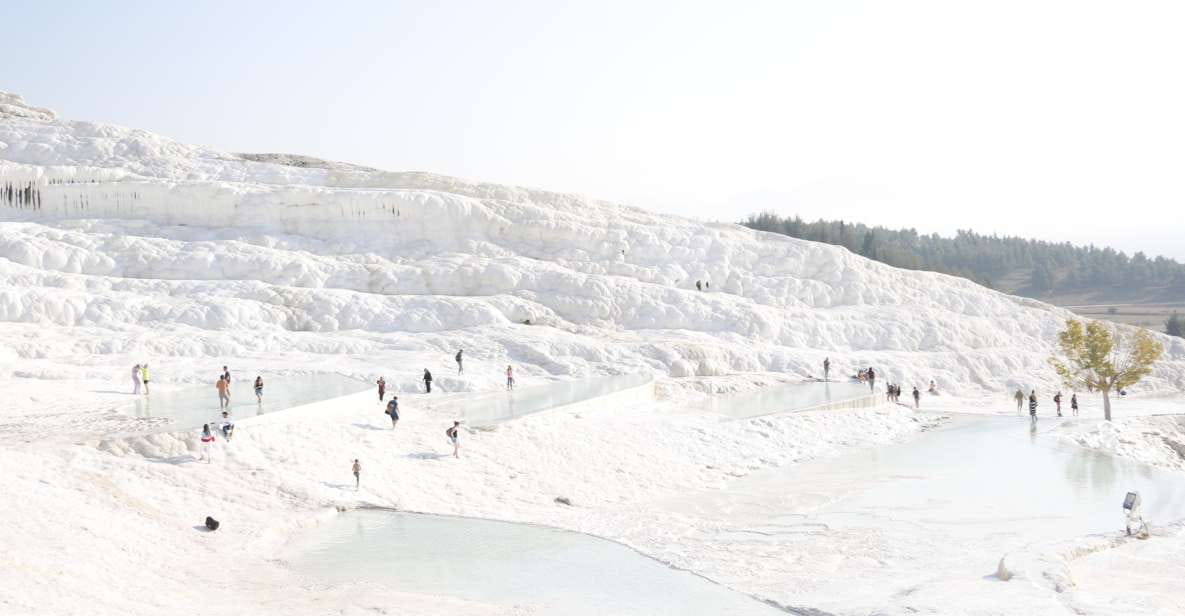
Nestled within the ancient city of Ephesus lie several revered religious sites that offer visitors a glimpse into the region’s rich spiritual heritage.
On the itinerary is the House of Virgin Mary, a pilgrimage site where the mother of Jesus is believed to have spent her final years.
Nearby stands the Church of St. John, built on the tomb of the apostle.
Visitors can also explore the Temple of Artemis, one of the Seven Wonders of the Ancient World, and the Isa Bey Mosque, a remarkable example of Seljuk architecture.
These sacred spaces provide a fascinating window into the diverse faiths that have shaped the history of this remarkable region.
More Great Tours NearbyDay 2: Pamukkale Tour
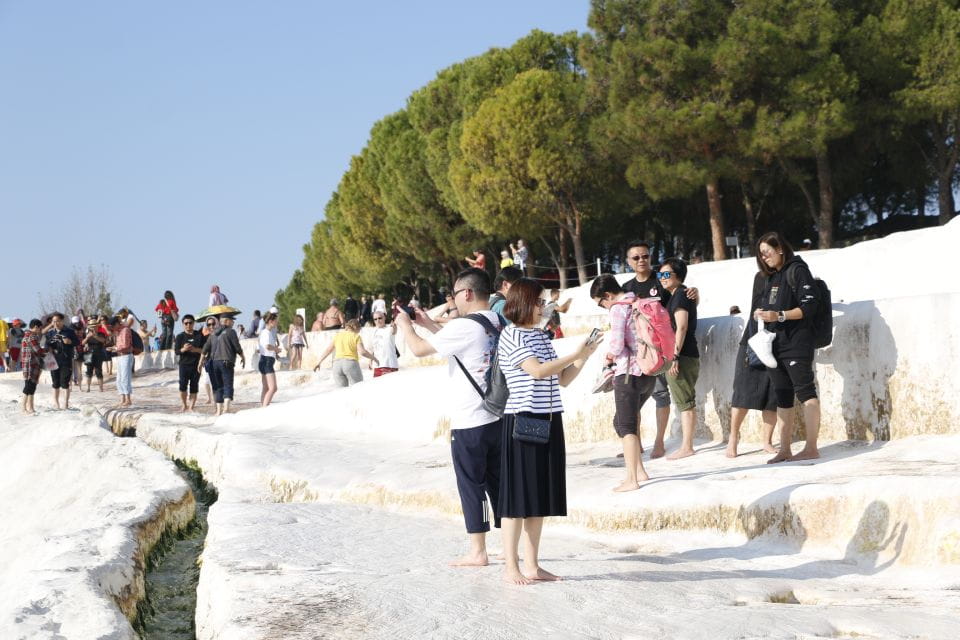
On the second day, travelers tour the UNESCO World Heritage site of Pamukkale, marveling at its striking white travertine terraces and the ancient ruins of Hierapolis.
They’ll explore the well-preserved remains of the Greco-Roman city, including the impressive Roman theater, the Plutonium, and the Necropolis – an ancient cemetery with sarcophagi and carved gravestones.
After wandering the historical site, they’ll have the chance to take a dip in the warm, mineral-rich waters of Pamukkale’s natural hot springs.
Following the Pamukkale tour, travelers will catch a flight back to Istanbul, concluding their 2-day adventure exploring Ephesus and this remarkable natural and archaeological wonder.
Here are more great tours and experiences we've reviewed in Selcuk
Exploring Pamukkale Travertines
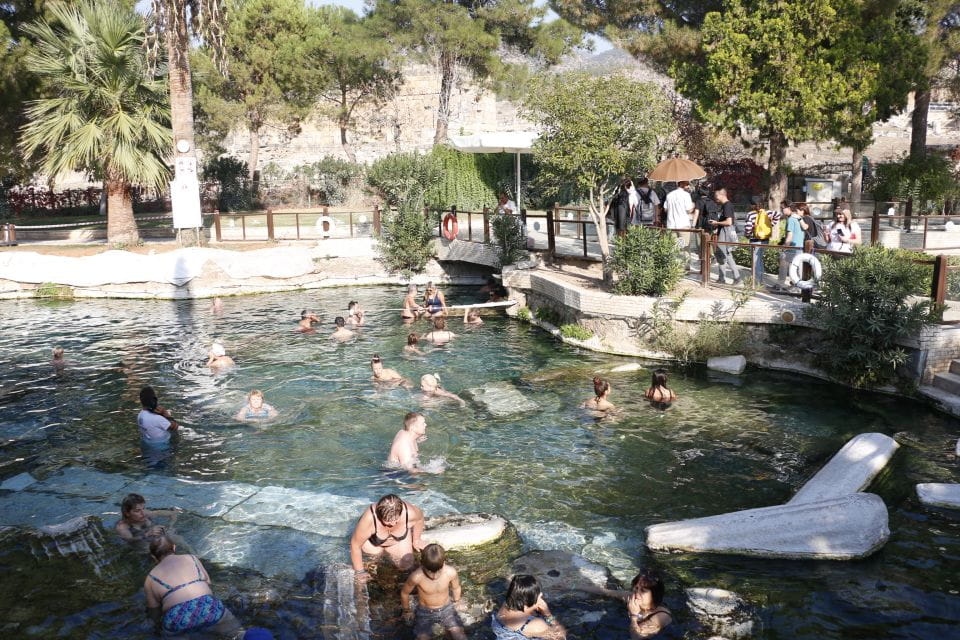
Visitors frequently marvel at the striking, gleaming white travertine terraces of Pamukkale, a remarkable natural wonder formed over centuries by the flow of mineral-rich thermal waters.
These terraces, known as ‘cotton castles,’ cascade down the hillside, creating a unique and visually stunning landscape. Visitors can explore the travertines by walking along the designated pathways, marveling at the incredible natural formations.
The waters of Pamukkale are also said to have therapeutic properties, and visitors can enjoy a relaxing soak in the warm, mineral-rich pools.
Key facts about Pamukkale’s travertines:
- Formed by the precipitation of calcium carbonate from the thermal spring waters.
- Designated as a UNESCO World Heritage site in 1988.
- Covers an area of over 2,700 acres.
- Maintained at a constant temperature of 35°C (95°F).
Ancient City of Hierapolis
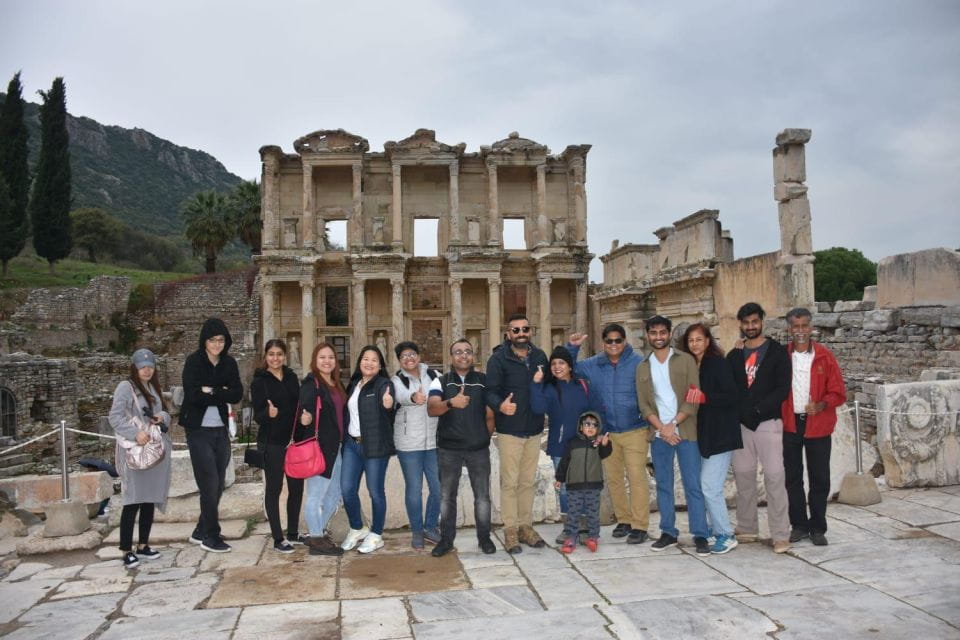
Adjacent to Pamukkale’s renowned travertine terraces lies the ancient city of Hierapolis, a UNESCO World Heritage site that offers a captivating glimpse into the region’s rich past. Established in the 2nd century BC, Hierapolis was a thriving Greco-Roman spa town known for its thermal springs and unique architecture. Visitors can explore the remarkably well-preserved ruins, including the magnificent Roman theater, the Necropolis with its elaborately carved sarcophagi, and the Plutonium, a sacred cave once believed to be the entrance to the underworld. The site also boasts an impressive Basilica and the remains of the ancient city walls. Hierapolis’ diverse heritage and stunning natural setting make it a must-visit destination for any traveler exploring the wonders of Pamukkale.
| Feature | Description |
|---|---|
| Established | 2nd century BC |
| UNESCO Site | Yes |
| Key Attractions | Roman theater, Necropolis, Plutonium, Basilica, City Walls |
| Architectural Style | Greco-Roman |
| Natural Setting | Adjacent to Pamukkale travertines |
Booking and Inclusions
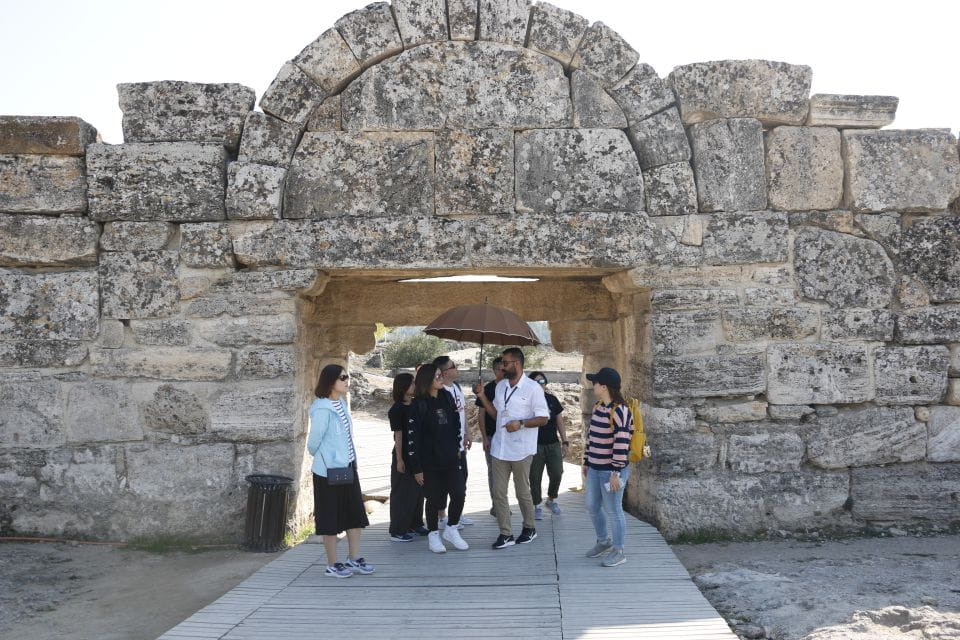
The 2-day Ephesus and Pamukkale trip from Istanbul can be booked starting at €477.51 per person, with free cancellation up to 24 hours in advance, and the option to reserve now and pay later.
The trip includes the following:
- Hotel pickup and drop-off in Istanbul
- Domestic flight tickets from Istanbul to Izmir and Denizli to Istanbul
- Overnight stay in Kusadasi or Selcuk
- English-speaking tour guide
- Entrance fees, breakfast, and lunch
The tour offers the opportunity to explore the ancient sights of Ephesus and the UNESCO World Heritage site of Pamukkale, making it an ideal way to experience the rich history and natural wonders of Turkey.
Frequently Asked Questions
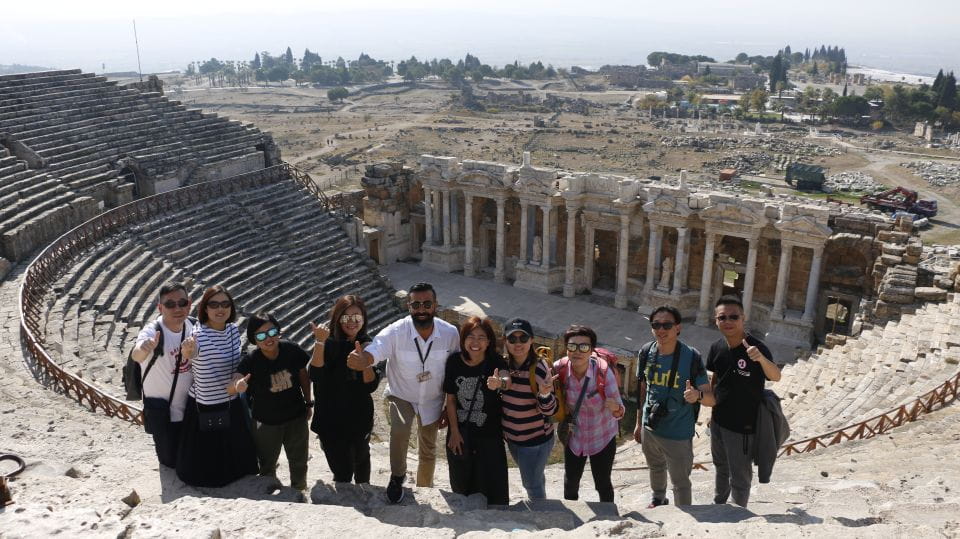
How Early Should I Arrive at the Airport for My Flight?
Generally, travelers should arrive at the airport 2 hours before a domestic flight and 3 hours before an international flight. This provides enough time to check-in, get through security, and reach the boarding gate.
Are There Any Dietary Restrictions for the Included Meals?
The included meals offer flexibility to accommodate various dietary needs. Travelers can notify the tour operator of any dietary restrictions, such as vegetarian, vegan, or gluten-free, and the staff will make the necessary arrangements.
Can I Bring My Own Snacks and Beverages on the Tour?
Yes, travelers can bring their own snacks and beverages on the tour. While meals are included, bringing extra provisions can provide variety and convenience. Tour organizers generally allow participants to bring their own food and drinks.
Is There a Dress Code for Visiting the Religious Sites?
When visiting religious sites, it’s generally expected to dress modestly. This typically means covering shoulders and knees, and avoiding clothing that’s overly revealing. Respecting the site’s dress code shows cultural awareness and sensitivity.
What Is the Best Way to Exchange Currency for the Trip?
Travelers can exchange currency at banks, ATMs, or authorized exchange bureaus before their trip. This allows them to have local currency on hand for expenses like entrance fees, meals, and souvenirs during the tour.
Recap
This 2-day trip from Istanbul offers a captivating exploration of ancient wonders.
Visitors will discover the remarkable archaeological site of Ephesus, including the House of Virgin Mary and the Isa Bey Mosque.
The second day is dedicated to the UNESCO World Heritage site of Pamukkale, featuring the iconic white travertine terraces and the ancient city of Hierapolis, with its well-preserved Greco-Roman ruins.
You can check availability for your dates here:More 1-Day Tours in Selcuk
More Tour Reviews in Selcuk
- Private Ephesus and Pamukkale 1 Day Tour
- PRIVATE Ephesus Tour for Cruise Passengers (Skip-the-Line)
- Kusadasi: Ephesus, St. John’s Basilica, and Virgin Mary Tour
- Ephesus Ancient City and Turkish Bath Only Cruise Guests
- Kusadasi: Ephesus, Virgin Mary House & Artemis Temple Tour
- Small Group Ephesus Tour for Cruise Passengers
Not for you? Here's more things to do in Selcuk we have recnetly reviewed
- From Kusadasi: Daily Ephesus Tour for Cruise Passengers
- PRIVATE EPHESUS and HOUSE OF VRGN MARY TOURS KUSADAS PORT
- Kusadasi: Private Biblical Ephesus Shore Excursion Tour
- Ephesus Private Tours Cruise Port Kusadasi Shore Excursions
- Shore Excursions: Half Day Ephesus & irince Village Tour
- Private Biblical Ephesus tour with BIBLE Oriented Tour guide
- Budget-Friendly Ephesus Tour from Izmir
- Private; Guided Ephesus Ancient City Tour from Cruise Ship
- Kusadasi Port: Ephesus Shore Excursion Small Group (max 10)
- Seven Churches of Revelation 4 Day Tour
- Selcuk: Full-Day Ephesus and House of Virgin Mary Tour
- House of Virgin Mary and Shopping Tour Cruiser Only
